Module 4 Planes, ships and trains .Unit 2 (共26张PPT)
文档属性
| 名称 | Module 4 Planes, ships and trains .Unit 2 (共26张PPT) |  | |
| 格式 | ppt | ||
| 文件大小 | 1.8MB | ||
| 资源类型 | 教案 | ||
| 版本资源 | 外研版 | ||
| 科目 | 英语 | ||
| 更新时间 | 2022-07-31 10:18:44 | ||
图片预览

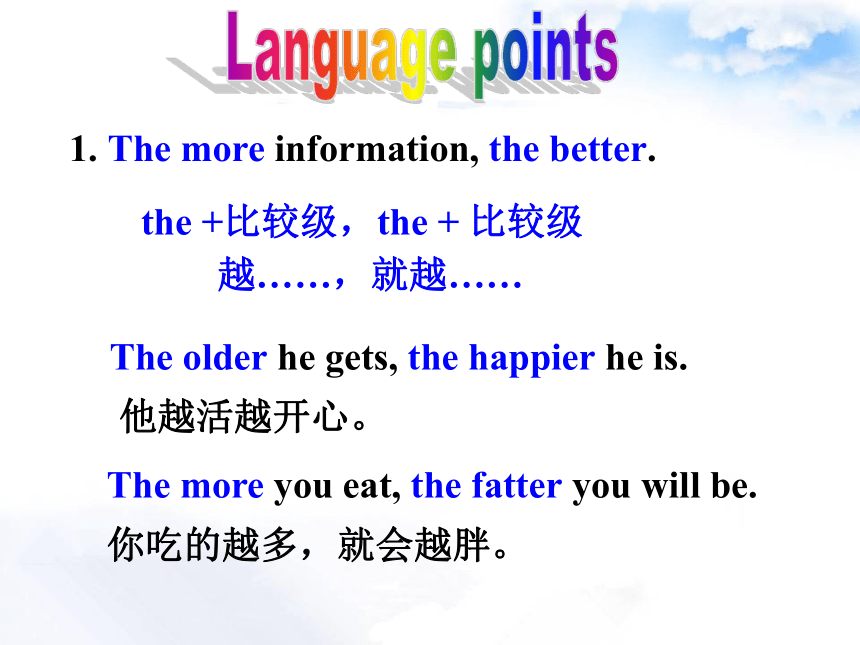
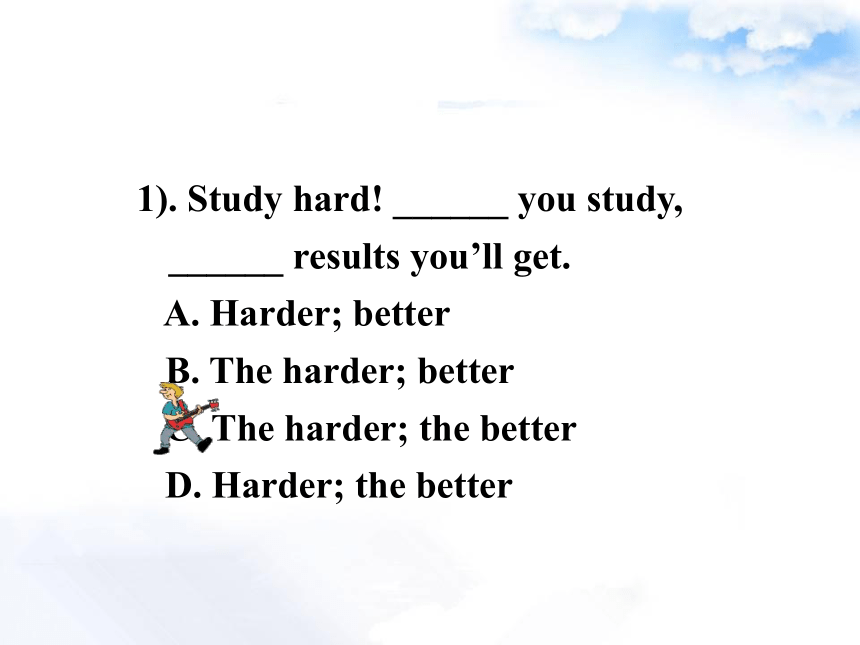

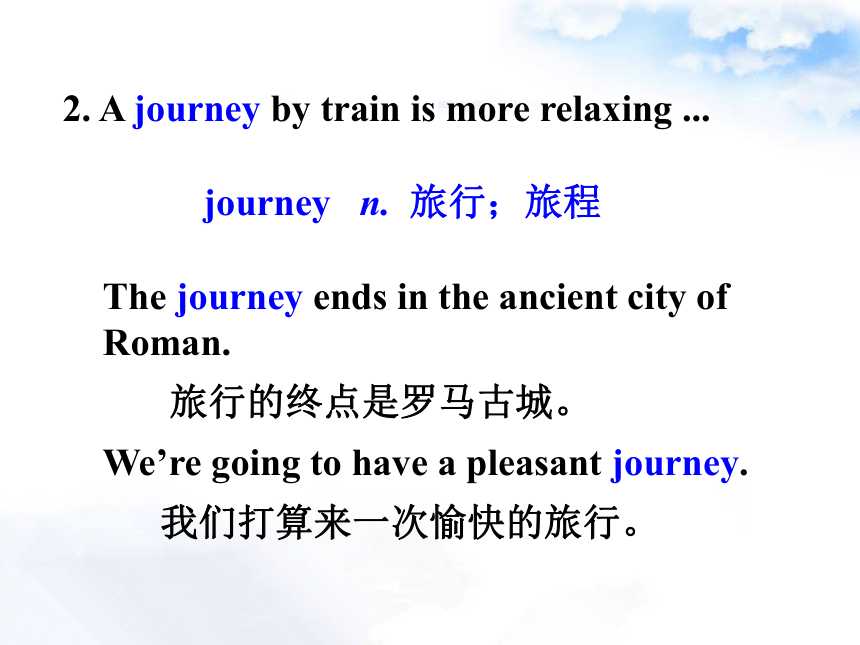
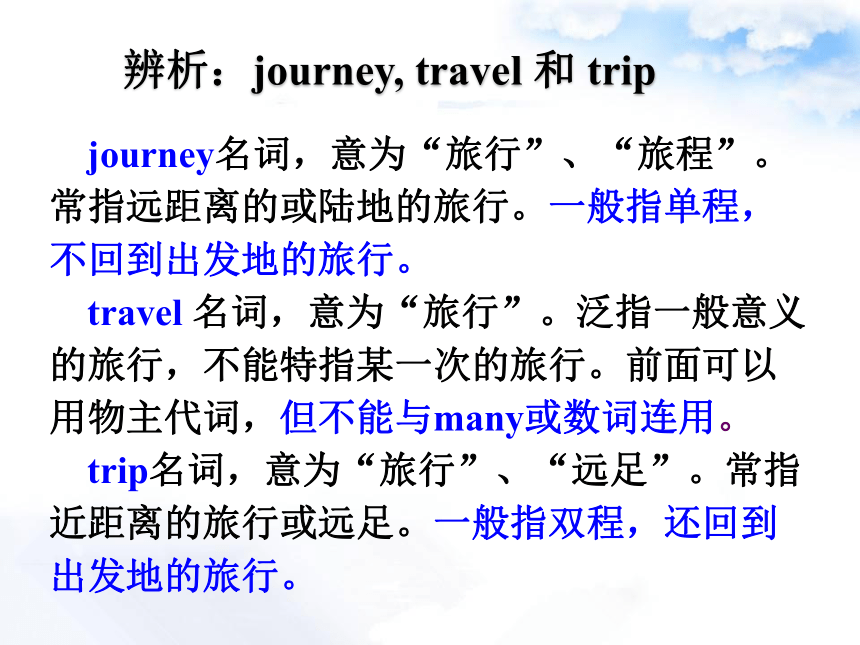
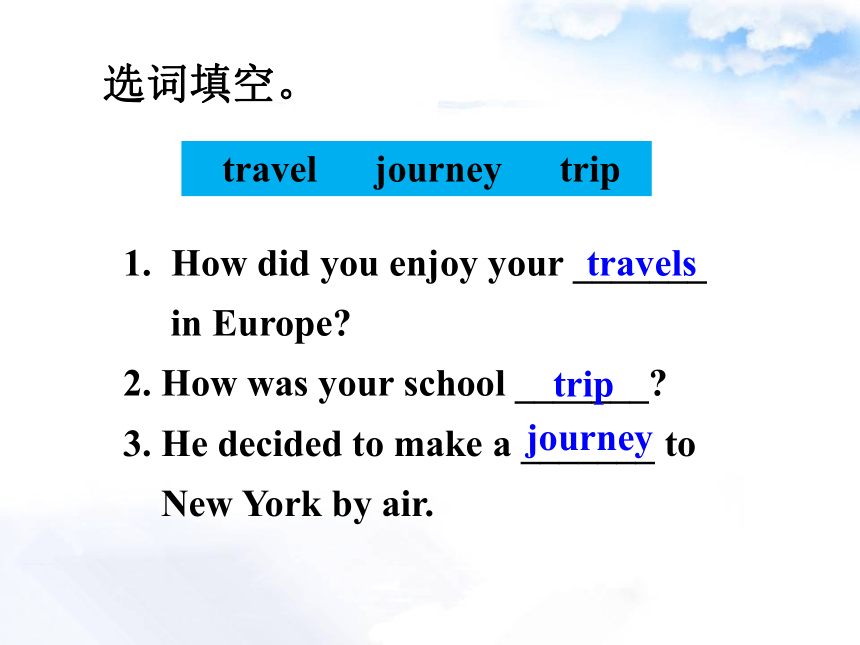
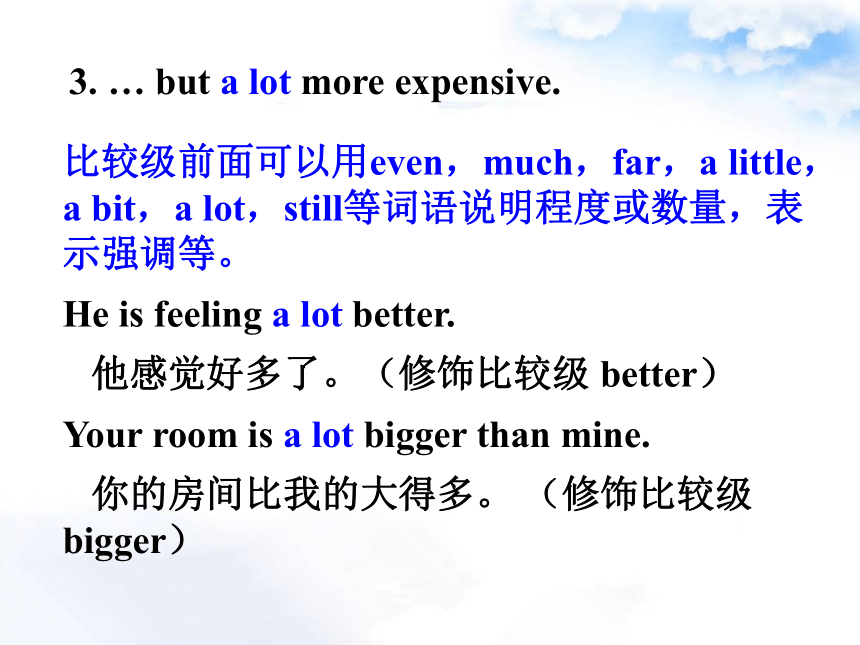
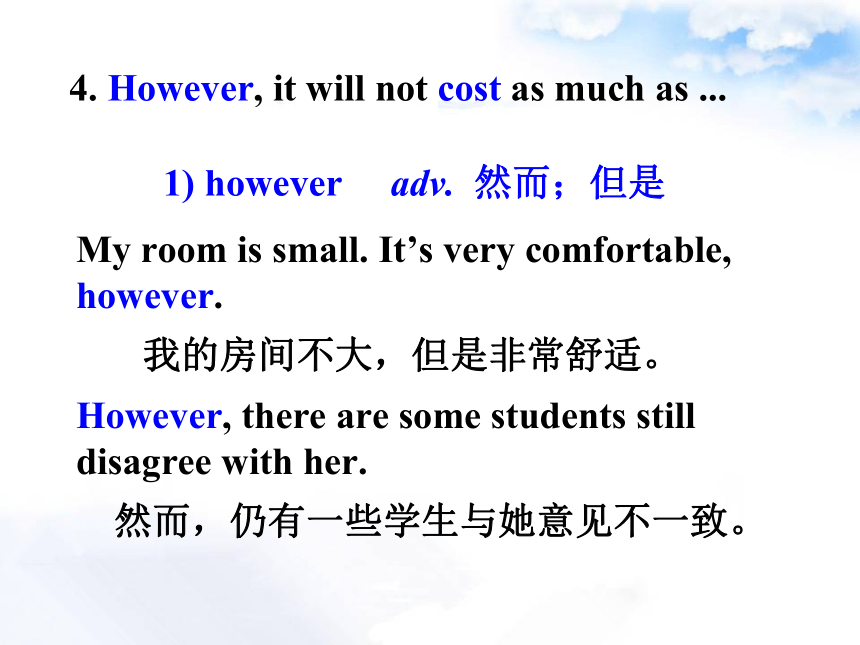
文档简介
(共26张PPT)
The older he gets, the happier he is.
他越活越开心。
1. The more information, the better.
the +比较级,the + 比较级
越……,就越……
The more you eat, the fatter you will be.
你吃的越多,就会越胖。
1). Study hard! ______ you study, ______ results you’ll get.
A. Harder; better
B. The harder; better
C. The harder; the better
D. Harder; the better
2). Dear students, please read every sentence carefully. _______ you are, _______ mistakes you’ll make.
A. The more carefully, the fewer
B. The more careful, the less
C. The more carefully, the less
D. The more careful, the fewer
2. A journey by train is more relaxing ...
journey n. 旅行;旅程
The journey ends in the ancient city of Roman.
旅行的终点是罗马古城。
We’re going to have a pleasant journey.
我们打算来一次愉快的旅行。
辨析:journey, travel 和 trip
journey名词,意为“旅行”、“旅程”。常指远距离的或陆地的旅行。一般指单程,不回到出发地的旅行。
travel 名词,意为“旅行”。泛指一般意义的旅行,不能特指某一次的旅行。前面可以用物主代词,但不能与many或数词连用。
trip名词,意为“旅行”、“远足”。常指近距离的旅行或远足。一般指双程,还回到出发地的旅行。
How did you enjoy your _______
in Europe
2. How was your school _______
3. He decided to make a _______ to
New York by air.
选词填空。
travel journey trip
travels
trip
journey
3. … but a lot more expensive.
比较级前面可以用even,much,far,a little,a bit,a lot,still等词语说明程度或数量,表示强调等。
He is feeling a lot better.
他感觉好多了。(修饰比较级 better)
Your room is a lot bigger than mine.
你的房间比我的大得多。 (修饰比较级 bigger)
My room is small. It’s very comfortable, however.
我的房间不大,但是非常舒适。
However, there are some students still disagree with her.
然而,仍有一些学生与她意见不一致。
1) however adv. 然而;但是
4. However, it will not cost as much as ...
1. 从语义上看,but所表示的是非常明显的对比,转折的意味比however强。
2. 从语法上看,but是个并列连词,而however却是个副词。
3. 从语序上看,but总是位于它所引出的分句之首,而however却可位于分句之首、之中或之尾。
4. 从标点上看,but之后一般不得使用逗号,但however位于分句之首时,通常用逗号;位于分句之中时,通常在其前、后各加一个逗号;位于分句之尾时,则必须在其前加逗号。
We love peace, but we are not afraid of war.
我们热爱和平,但是我们并不害怕战争。
He hasn’t arrived. He may, however, come later.
他还没有到,不过,他可能过一会儿来。
The new house of this firm cost $8,000.
这家公司的新房价钱为8000美元。
It’s going to cost me over $100,000 to buy new cars.
买几辆新车将花掉我10万多美元。
2) cost v. 价钱为; 花费
cost的过去式和过去分词同原形
形式一样,三词同形。
cost, spend, take的用法区别
三者均可表示“花费”,但所用主语不同:
cost:主语通常是事或物(包括形式主语 it),不能是人
spend:主语只能是人,不能是事或物
take:主语可以是事或物(包括形式主语 it),也可以是人
The computer cost (me) $2000.
这台电脑花了(我)2000 美元。
I have spent all day looking for you.
我花了一整天找你。
It took me an hour to write the letter. / The letter took me an hour (to write). / I took an hour to write the letter.
我写这封信花了一个小时。
cost的主语通常是事或物,用法如下:
(1) sth. costs (sb.) +金钱。
某物花了(某人)多少钱
A new computer costs a lot of money.
买一台新电脑要花一大笔钱。
从句型结构来看,三者的通常句型为:
(2) (doing) sth. costs (sb.) +时间,某物(做某事)花了(某人)多少时间
Remembering these new words cost him a lot of time.
他花了大量时间才记住了这些单词。
注意:cost不能用于被动句。
spend的主语必须是人, 常用于以下结构:
(1) spend time /money on sth. 在……上花费时间(钱)。如:
I spent two hours on this Maths problem.
这道数学题花了我两个小时。
(2) spend time/money (in) doing sth. 花费时间(金钱)做某事。如:
They spent two years (in) building this bridge.
造这座桥花了他们两年时间。
(3) spend money for sth. 花钱买……。如:
His money was spent for books.
他的钱用来买书了。
take后面常跟双宾语,常见用法有以下几种:
(1) It takes sb. time to do sth. 做某事花了某人多少时间。如:
It took them three years to build this road.
他们用了三年时间修完了这条路。
(2) doing sth. takes sb. time,做某事花了某人多少时间。如:
Repairing this car took him the whole afternoon.
他花了一下午的时间修车。
(3) sb. takes time/money to do sth.,某人花多少时间或钱去做某事
He took the whole afternoon to repair his car.
他花了一下午的时间修车。
这件外套花费了我100元。
翻译:
It takes me 100 yuan to buy this coat.
I spend 100 yuan on this coat.
= I spend 100 yuan buying this coat.
This coat costs me 100 yuan.
n. 价钱;成本;代价
The total cost of the project would be more than $240 million.
该项目的总成本会超过2.4亿美元。
We have to sum up the costs of production.
我们得计算一下生产成本。
The cost of a loaf of bread has increased
five-fold.
一条面包的价钱增长了4倍。
Whatever the cost, she was going out to Britain.
不管付出什么代价,她就是要到英国去。
选词填空: cost, take, spend
The woman usually _______ a lot of
money on clothes.
2. How much does the sweater _______
3. It _______ me twenty yuan to buy this book.
4. The boy _______ one hour playing soccer every day.
spends
cost
took
spends
1. Write about the best way from your home town to Beijing and the reason.
2. Try to retell the passage.
The older he gets, the happier he is.
他越活越开心。
1. The more information, the better.
the +比较级,the + 比较级
越……,就越……
The more you eat, the fatter you will be.
你吃的越多,就会越胖。
1). Study hard! ______ you study, ______ results you’ll get.
A. Harder; better
B. The harder; better
C. The harder; the better
D. Harder; the better
2). Dear students, please read every sentence carefully. _______ you are, _______ mistakes you’ll make.
A. The more carefully, the fewer
B. The more careful, the less
C. The more carefully, the less
D. The more careful, the fewer
2. A journey by train is more relaxing ...
journey n. 旅行;旅程
The journey ends in the ancient city of Roman.
旅行的终点是罗马古城。
We’re going to have a pleasant journey.
我们打算来一次愉快的旅行。
辨析:journey, travel 和 trip
journey名词,意为“旅行”、“旅程”。常指远距离的或陆地的旅行。一般指单程,不回到出发地的旅行。
travel 名词,意为“旅行”。泛指一般意义的旅行,不能特指某一次的旅行。前面可以用物主代词,但不能与many或数词连用。
trip名词,意为“旅行”、“远足”。常指近距离的旅行或远足。一般指双程,还回到出发地的旅行。
How did you enjoy your _______
in Europe
2. How was your school _______
3. He decided to make a _______ to
New York by air.
选词填空。
travel journey trip
travels
trip
journey
3. … but a lot more expensive.
比较级前面可以用even,much,far,a little,a bit,a lot,still等词语说明程度或数量,表示强调等。
He is feeling a lot better.
他感觉好多了。(修饰比较级 better)
Your room is a lot bigger than mine.
你的房间比我的大得多。 (修饰比较级 bigger)
My room is small. It’s very comfortable, however.
我的房间不大,但是非常舒适。
However, there are some students still disagree with her.
然而,仍有一些学生与她意见不一致。
1) however adv. 然而;但是
4. However, it will not cost as much as ...
1. 从语义上看,but所表示的是非常明显的对比,转折的意味比however强。
2. 从语法上看,but是个并列连词,而however却是个副词。
3. 从语序上看,but总是位于它所引出的分句之首,而however却可位于分句之首、之中或之尾。
4. 从标点上看,but之后一般不得使用逗号,但however位于分句之首时,通常用逗号;位于分句之中时,通常在其前、后各加一个逗号;位于分句之尾时,则必须在其前加逗号。
We love peace, but we are not afraid of war.
我们热爱和平,但是我们并不害怕战争。
He hasn’t arrived. He may, however, come later.
他还没有到,不过,他可能过一会儿来。
The new house of this firm cost $8,000.
这家公司的新房价钱为8000美元。
It’s going to cost me over $100,000 to buy new cars.
买几辆新车将花掉我10万多美元。
2) cost v. 价钱为; 花费
cost的过去式和过去分词同原形
形式一样,三词同形。
cost, spend, take的用法区别
三者均可表示“花费”,但所用主语不同:
cost:主语通常是事或物(包括形式主语 it),不能是人
spend:主语只能是人,不能是事或物
take:主语可以是事或物(包括形式主语 it),也可以是人
The computer cost (me) $2000.
这台电脑花了(我)2000 美元。
I have spent all day looking for you.
我花了一整天找你。
It took me an hour to write the letter. / The letter took me an hour (to write). / I took an hour to write the letter.
我写这封信花了一个小时。
cost的主语通常是事或物,用法如下:
(1) sth. costs (sb.) +金钱。
某物花了(某人)多少钱
A new computer costs a lot of money.
买一台新电脑要花一大笔钱。
从句型结构来看,三者的通常句型为:
(2) (doing) sth. costs (sb.) +时间,某物(做某事)花了(某人)多少时间
Remembering these new words cost him a lot of time.
他花了大量时间才记住了这些单词。
注意:cost不能用于被动句。
spend的主语必须是人, 常用于以下结构:
(1) spend time /money on sth. 在……上花费时间(钱)。如:
I spent two hours on this Maths problem.
这道数学题花了我两个小时。
(2) spend time/money (in) doing sth. 花费时间(金钱)做某事。如:
They spent two years (in) building this bridge.
造这座桥花了他们两年时间。
(3) spend money for sth. 花钱买……。如:
His money was spent for books.
他的钱用来买书了。
take后面常跟双宾语,常见用法有以下几种:
(1) It takes sb. time to do sth. 做某事花了某人多少时间。如:
It took them three years to build this road.
他们用了三年时间修完了这条路。
(2) doing sth. takes sb. time,做某事花了某人多少时间。如:
Repairing this car took him the whole afternoon.
他花了一下午的时间修车。
(3) sb. takes time/money to do sth.,某人花多少时间或钱去做某事
He took the whole afternoon to repair his car.
他花了一下午的时间修车。
这件外套花费了我100元。
翻译:
It takes me 100 yuan to buy this coat.
I spend 100 yuan on this coat.
= I spend 100 yuan buying this coat.
This coat costs me 100 yuan.
n. 价钱;成本;代价
The total cost of the project would be more than $240 million.
该项目的总成本会超过2.4亿美元。
We have to sum up the costs of production.
我们得计算一下生产成本。
The cost of a loaf of bread has increased
five-fold.
一条面包的价钱增长了4倍。
Whatever the cost, she was going out to Britain.
不管付出什么代价,她就是要到英国去。
选词填空: cost, take, spend
The woman usually _______ a lot of
money on clothes.
2. How much does the sweater _______
3. It _______ me twenty yuan to buy this book.
4. The boy _______ one hour playing soccer every day.
spends
cost
took
spends
1. Write about the best way from your home town to Beijing and the reason.
2. Try to retell the passage.
同课章节目录
- Module 1 How to learn English
- Unit 1 Let's try to speak English as much as possi
- Unit 2 You should smile at her.
- Unit 3 Language in use .
- Module 2 My home town and my country
- Unit 1 It's taller than many other buildings.
- Unit 2 Cambridge is a beautiful city in the east o
- Unit 3 Language in use .
- Module 3 Sports.
- Unit 1 Nothing is more exciting than playing tenni
- Unit 2 This year we training more carefully.
- Unit 3 Language in use .
- Module 4 Planes, ships and trains .
- Unit 1 He lives the farthest from school.
- Unit 2 What is the best way to travel.
- Unit 3 Language in use .
- Module 5 Lao She Teahouse.
- Unit 1 I wanted to see the Beijing Opera.
- Unit 2 It descibes the changes in Chinese society.
- Unit 3 Language in use .
- Module 6 Animals in danger.
- Unit 1 It allows people to get closer to them .
- Unit 2 The WWF is working hard to save them all.
- Unit 3 Language in use .
- Revision module A
- Module 7 A famous story
- Unit 1 Alice was sitting with her sister by the ri
- Unit 2 She was thinking about her cat.
- Unit 3 Language in use .
- Module 8 Accidents
- Unit 1 While the car were changing to red, a car s
- Unit 2 I was trying to pick it up when it bite me
- Unit 3 Language in use .
- Module 9 Population
- Unit 1 The population of China is about 1.37 billi
- Unit 2 Arnwick was a city with 200,000 people.
- Unit 3 Language in use .
- Module 10 The weathe
- Unit 1 It might snow.
- Unit 2 The weather is fine all year round.
- Unit 3 Language in use .
- Module 11 Way of life
- Unit 1 In China ,we open a gift later.
- Unit 2 In England, you usually drink tea with milk
- Unit 3 Language in use .
- Module 12 Help
- Unit 1 What should we do before help arrives?
- Unit 2 Stay away from windows and heavy furniture.
- Unit 3 Language in use .
- Revision module B
